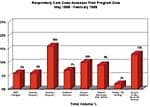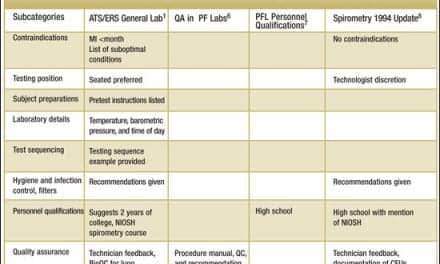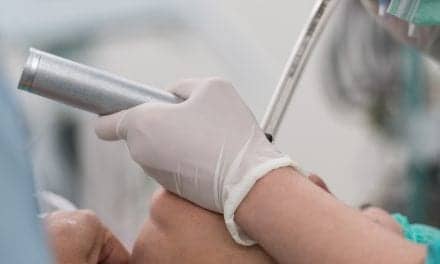King Faisal Specialist Hospital and Research Centre provides RTs opportunities worth their weight in gold.

A Global Melting Pot for RTs
Former Faisal staff therapist and manager Mike Masters, RRT—who currently lives and works in Park City, Utah—believes strongly that a King Faisal stint for therapists provides a rich background that generally boosts one’s career and also serves as an excellent way to meet therapists from all over the United States, Canada, and other countries. “The therapists have so much autonomy at King Faisal, and my experience was the best I’ve ever had professionally, financially, and personally,” says Masters, who, in addition to having worked in Saudi Arabia, has worked in 10 different hospitals in three US states. “It’s the only place in the world that has a melting pot of RTs—you meet therapists and medical professionals from all over the world, which means you’re constantly exposed to new methods of patient care.”
Masters, who met his wife (a nurse from Scotland) at King Faisal, enjoyed his experience so much that after a 5-year assignment 10 years ago, he returned in January 1999 for a 6-month job as a staff therapist. He adds that he and his wife frequently discuss the possibility of returning to King Faisal. “I’ve recruited eight people to work over there, and I continue to actively recruit others because I want to educate therapists about what they are missing,” Masters says.

Most of King Faisal’s RTs are Americans and Canadians, but some were also trained in Saudi Arabia, the Philippines, Sudan, and North Yemen. Currently, 40% of the therapists are Americans and 50% are Canadian. “Working at King Faisal gives therapists a multi-cultural exposure to the practice of respiratory therapy,” explains Wrae Hill, RRT, director of respiratory care at the hospital. “By having medical professionals from around the world working here, we have a truly international focus, which is unusual in North America,” says Hill, a Canadian and 4-year veteran of King Faisal.
This global focus on health care is what Masters particularly liked about his job. He cites one occasion when he assisted a physician with a percutaneous tracheotomy, a procedure performed frequently in Europe. “Since coming back to the States, I’ve talked to pulmonologists and therapists who have said they know very little about this procedure,” Masters says. “It’s very interesting being exposed to all these different international procedures, and you begin to realize that sometimes there are better ways of doing things.”
Respiratory Care in the Hospital City
King Faisal, more commonly called “Hospital City,” was created in 1975 as a referral institution to provide specialized medical care for Saudi citizens, eliminating the need for treatment abroad. It has more than 6,000 employees from more than 50 countries. Based on the North American model, the hospital’s respiratory care department is the largest full-service facility existing outside of North America. Therapists provide care to patients with cardiopulmonary, neurologic, or metabolic disorders who require diagnostic pulmonary function testing, administration of therapeutic medical gases or aerosols, ventilatory life support systems, cardiopulmonary resuscitation, bronchopulmonary hygiene, or maintenance of natural or artificial airways. In some ways, King Faisal’s respiratory department is even more advanced than many teaching hospitals in North America and Europe.
No expense has been spared in equipping the department with the latest and most expensive equipment. A wide array of modern equipment to provide ongoing diagnostic and ventilatory life support is available throughout the department. Monitoring devices include pulse oximetry, end-tidal CO2 monitors, neonatal volume monitors, and airway pressure monitors.
Primary adult ventilatory support is provided using the latest ventilators and bi-level positive airway pressure systems. High-frequency oscillatory ventilation is offered as well as inhaled nitric oxide, using an in-house design that features analyzers and accessories to treat pulmonary hypertensive states in high-risk infants and cardiac surgical patients. Clinical strategies and techniques are currently under development for the most effective treatment of adult respiratory distress syndrome (ARDS) with inhaled nitrous oxide.

The blood gas laboratories feature the most advanced analyzers and cooximeters and interface with the hospital-wide information system. The pulmonary diagnostics laboratory offers complete respiratory mechanics and performance testing including spirometry with flow-volume loops, helium dilution and body plethysmography lung volumes, single breath and steady state lung diffusion measurements, plus treadmill and bicycle cardiopulmonary exercise testing. For the most part, therapists draw and run all arterial blood gases in one of seven different laboratories located in each intensive care unit (ICU), emergency department, and pulmonary function area.
The professional opportunities that exist in such an advanced respiratory care department are why so many therapists from around the world are interested in working at King Faisal. At the same time, because of the demands of the job, only the most experienced and well-educated therapists are hired to work at the hospital. All RTs must be certified in advanced cardiac life support (ACLS), pediatric advanced life support (PALS), or neonatal resuscitation program (NRP). “In all the general care areas and many of the ICUs, RTs are the first-line intubators,” Hill notes.
The department’s medical director, Mohammed Zeitouni, MD, FCCP, is a US board-certified intensivist and pulmonologist, who has done fellowships in Cleveland. “He is a dedicated RT advocate and provides us with excellent clinical and medical direction,” Hill says.
Job Requirements
King Faisal requires all therapists to have an associate degree in respiratory therapy or equivalent, current registration by the National Board of Respiratory Care (NBRC) of the United States, or the Canadian Society of Respiratory Therapists (CSRT), and a minimum of 2 years of postregistry work experience. According to Hill, the average experience level of staff therapists is approximately 11.6 years, while the management team averages just over 18.5 years of experience.
In addition to Hill’s position as department head, the remaining respiratory staff at King Faisal includes an assistant head, 50 RRTs (North American-trained), 10 RTs (Philippine-trained), two pulmonary function technologists, five blood gas technologists, and two respiratory care assistants. Currently, the hospital is short about 15 RRTs. Hill points out that although the department is budgeted for 79 employees, it actually needs 85. “We’re currently putting in about 2,000 hours of overtime per month due to recent service expansions,” Hill says. King Faisal has also recently opened a 250-bed tertiary care hospital in Jeddah, which has 30 job openings. The same scope of services will be offered in Jeddah with more emphasis placed on private sector patients.
One staffing change that is new at King Faisal is that there are no more supervisors. In June 1999, the department threw out its top-heavy supervisory structure (six supervisors/65 RRTs) for a charge RRT structure in which charge RRTs are selected by their peers. These therapists carry a 60% to 80% clinical load and have some administrative duties as well. “This has resulted in more effective use of our excellent clinical staff, with 88% of the staff providing direct patient care,” Hill says. “Most of the staff are happy with this new arrangement since it encourages strong communication with peers,” he adds. This restructuring has also created a high level of intrinsic accountability, which makes work more rewarding.
The department has six charge therapists who work day or night 12-hour shifts and cover codes in the coronary care unit and emergency department, and handle sick calls and overtime duties. These therapists balance their workload in seven different intensive care units. In addition, there is a core group of specialized therapists who work in the cardiac surgical ICU, the medical/surgical ICU, pediatric ICU, the newborn ICU, the East Wing (ICU and general patient floors), children’s cancer center, and Jeddah Hospital. According to Hill, most therapists choose to specialize in one of these areas within 6 months of working at Faisal.
Therapists working in the fast-paced cardiac surgical ICU see a high volume of very complicated pediatric congenital heart disease patients, as well as adults with complicated coronary artery bypass graft or valves. In the medical/surgical ICU, there is a high volume of challenging pediatric and adult ARDS cases, not to mention surgical/metabolic and septic patients. The pediatric ICU has a number of clinically challenging patients, including those with complicated metabolic and heart and lung problems who require surfactant therapy. Therapists assigned to the neonatal ICU attend all high-risk deliveries and cesarean sections. The eight-bed ICU in the Children’s Care Center relies on therapists who provide all therapeutic and diagnostic functions: oxygen and bronchodilator therapy, primary intubator at codes, spirometry, arterial blood gases, and ventilator management.
One interesting aspect for King Faisal’s respiratory therapists is that they work with many health care professionals from other countries who are not familiar with RTs. Regardless of this fact, Masters points out that once these staff members start working closely with the therapists they immediately start to value their work. “Whether it’s a nurse or anesthesiologist who is used to making vent changes or looking at the patient’s blood gases, they end up appreciating that it’s one less thing they are required to do,” he says.
Hill agrees that most non-North American nurses and physicians are sold on RTs within a few weeks of working with them. “We do great work, which is recognized and appreciated by our colleagues from centers outside of North America,” Hill says.
Personal Rewards
Former Faisal therapist John Wolfe, RRT, currently based in Denver, agrees that there are enormous rewards in working in Saudi Arabia. He spent 4 years at King Faisal starting in 1991, after he and his wife sold their house and cars and moved their two young children to Riyadh. Wolfe originally signed a 2-year contract to work at the hospital but then he and his wife, who worked as a nurse in the same hospital, decided to stay another 2 years. “In addition to getting used to good, tax-free salaries with lots of paid vacation, our two children were getting an excellent education at the Saudi Arabian International School in Riyadh,” Wolfe says. “We both felt that the best professional and personal decision we could make was to stay another couple of years in Saudi Arabia,” he says.
Wolfe points out that recruiters are very careful when hiring foreigners to work in Saudi Arabia. In addition to assessing the applicants’ attitudes about living far away from home in such a dramatically different culture, recruiters also pay close attention to their professional experience to ensure that they would be a good match. Wolfe prepared for this type of scrutiny by becoming registered and even worked an additional stint at Denver General Hospital to brush up on his bedside skills. “When I had originally wanted to take this assignment in Riyadh, a recruiter advised me to do this, since I had been working the past couple of years in home care and that wasn’t viewed as favorably as working in an acute care facility,” Wolfe says.
Wolfe looks back fondly at his years working in Riyadh. “It was clearly an opportunity of a lifetime,” he stresses. “I had far greater experience at the bedside than I had had in Colorado and was exposed to a great number of challenging cases.”
Aside from excellent career opportunities, Wolfe and his family also experienced some unbelievable vacations and even some once-in-a-life adventures. For example, on one occasion, Wolfe was called to visit the king’s mother-in-law at home, since she had an oxygen concentrator for her respiratory problems, even though no one had ever explained to her or her staff how to use it. “I was sent because of my home care experience,” Wolfe remarks. “Her staff picked me up at my apartment and then drove me to her incredible mansion. Here I was an American in a bedroom of a member of the royal family, surrounded by servants. I’ll never forget that moment for as long as I live.”
Therapists such as Masters and Wolfe also stress that you cannot find a better social life than with the King Faisal extended employee family. “Because you’re not distracted by outside forms of entertainment or other activities, you focus on socializing,” Masters says. “I formed some of my best friendships with people during my years at King Faisal.” In addition, since the majority of therapists are Americans or Canadians, staff frequently runs into therapists whom they had known previously back home.
The hospital’s Employee Social Club offers many recreational opportunities, including exercise areas, lighted tennis and squash courts, a bowling alley, golf courses, and an Olympic-sized swimming pool. A wide range of activities are scheduled daily and weekly including swimming and aerobics classes, team sports, marathons and triathlons, horseback riding, and special classes for crafts, hobbies, and cooking.
Sightseeing excursions are held frequently, which makes sense since some employees have up to 10 weeks of vacation. Some of the most popular destinations are trips to the desert and diving in the Red Sea—one of the most beautiful underwater destinations in the world.
Orientation for New Hires
Because the transition to living and working in Saudi Arabia is substantial, an extensive training program is offered for new RTs. The recruiting organizations in the United States (Nashville-based HCA International) and Canada (Toronto-based Helen Ziegler & Associates) both offer formal orientation programs for therapists prior to their arriving in Saudi Arabia. Once they arrive at King Faisal, they participate in a 7-week clinical orientation. According to Hill, the orientation provides a number of tools, including prereading assignments, Competency Based Assessments (CBAs), and knowledge reviews. The knowledge reviews are designed to reinforce the reading that is assigned to new therapists prior to their ICU and general care rotations. A charge therapist is assigned to each new hire and is available to guide them through their early weeks.
RTs are required to earn 20 CEU credits per year and must maintain current basic cardiac life support, ACLS, and NRP certifications. The department offers ample clinical education opportunities to satisfy these requirements, including life support training using American Hospital Association or American Academy of Pediatrics standards. Hill also notes that a new employee review system is being widely received by the staff. “These new peer-reviewed performance appraisals encourage better communication and accountability among peers at the bedside,” Hill says.
An Opportunity Worth Repeating
With so many opportunities for therapists working at King Faisal, it is easy to see why so many return to the hospital for repeat or permanent assignments down the road. Most therapists sign 1- or 2-year contracts that are renewable. The department is also piloting two staffing projects: a part-time program for therapists wishing to work 23 to 40 hours a week and a 6-month, short-term assignment for full-time employees.
Although the majority of therapists work for 2 to 4 years at a time, some like Masters can not seem to get enough. “I would definitely like to return some day,” he notes.
“It’s always an incredible experience when you’re given so much autonomy and respect and are also able to work with some of the world’s best RTs.”
Carol Daus is a contributing writer for RT Magazine.









